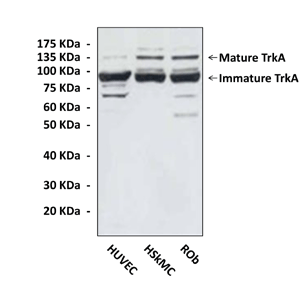Anti-TrkA: Polyclonal TrkA Antibody |
 |
BACKGROUND Trk receptors are a family of three receptor tyrosine kinases, each of which can be activated by one or more of four neurotrophins—nerve growth factor (NGF), brain-derived neurotrophic factor (BDNF), and neurotrophins 3 and 4 (NT3 and NT4). The three most common types of trk receptors are trkA, trkB, and trkC. Each of these receptors types has different binding affinity to certain types of neurotrophins. TrkA has the highest affinity to the binding nerve growth factor (NGF). TrkB has the highest affinity to the binding brain-derived neurotrophic factor (BDNF) and NT-4. TrkC is ordinarily activated by binding with NT-3 and has little activation by other ligands.1 Neurotrophin signaling through these receptors regulates cell survival, proliferation, the fate of neural precursors, axon and dendrite growth and patterning, and the expression and activity of functionally important proteins, such as ion channels and neurotransmitter receptors.2 In the adult nervous system, the Trk receptors regulate synaptic strength and plasticity. The cytoplasmic domains of Trk receptors contain several sites of tyrosine phosphorylation that recruit intermediates in intracellular signaling cascades. As a result, Trk receptor signaling activates several small G proteins, including Ras, Rap-1, and the Cdc-42-Rac-Rho family, as well as pathways regulated by MAP kinase, PI 3-kinase and phospholipase-C-γ (PLC-γ).3 Trk receptor activation has different consequences in different cells, and the specificity of downstream Trk receptor-mediated signaling is controlled through expression of intermediates in these signaling pathways and membrane trafficking that regulates localization of different signaling constituents. Perhaps the most fascinating aspect of Trk receptor-mediated signaling is its interplay with signaling promoted by the pan-neurotrophin receptor p75NTR.4 p75NTR activates a distinct set of signaling pathways within cells that are in some instances synergistic and in other instances antagonistic to those activated by Trk receptors. Several of these are proapoptotic but are suppressed by Trk receptor-initiated signaling. p75NTR also influences the conformations of Trk receptors; this modifies ligand-binding specificity and affinity with important developmental consequences.
REFERENCES
1. Huang EJ & Reichardt LF: Ann. Rev. Biochem. 72:609-642, 2003.
2. Barbacid M et al.: Biochim Biophys Acta. 1072:115-27, 1991.
3. Arévalo JC & Wu SH: Cell Mol Life Sci. 63:1523-37, 2006.
4. Roux PP & Barker PA: Prog Neurobiol. 67:203-33, 2002.
5. Cantarella G et al.: FASEB J. 16:1307-9, 2002.
6. Rende M et al.: Int J Dev Neurosci. 18:869-85, 2000.
7. Pinski J et al.: Cancer Research 62:986-989, 2002.
2. Barbacid M et al.: Biochim Biophys Acta. 1072:115-27, 1991.
3. Arévalo JC & Wu SH: Cell Mol Life Sci. 63:1523-37, 2006.
4. Roux PP & Barker PA: Prog Neurobiol. 67:203-33, 2002.
5. Cantarella G et al.: FASEB J. 16:1307-9, 2002.
6. Rende M et al.: Int J Dev Neurosci. 18:869-85, 2000.
7. Pinski J et al.: Cancer Research 62:986-989, 2002.
Products are for research use only. They are not intended for human, animal, or diagnostic applications.
Параметры
Cat.No.: | CA1321 |
Antigen: | Human TrkA carboxyl-terminal sequence |
Isotype: | Rabbit Polyclonal |
Species & predicted species cross- reactivity ( ): | Human, Rat, Mouse |
Applications & Suggested starting dilutions: | WB 1:1000 IP 1:50 IHC (Paraffin) 1:100 ICC n/d FACS n/d |
Predicted Molecular Weight of protein: | 88/140 kDa |
Specificity/Sensitivity: | Detects endogenous levels of TrkA protein in normal primary cell lysates. |
Storage: | Store at 4° C for frequent use; at -20° C for at least one year. |
*Optimal working dilutions must be determined by end user.
Документы
Информация представлена исключительно в ознакомительных целях и ни при каких условиях не является публичной офертой








